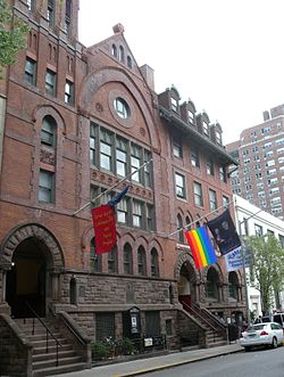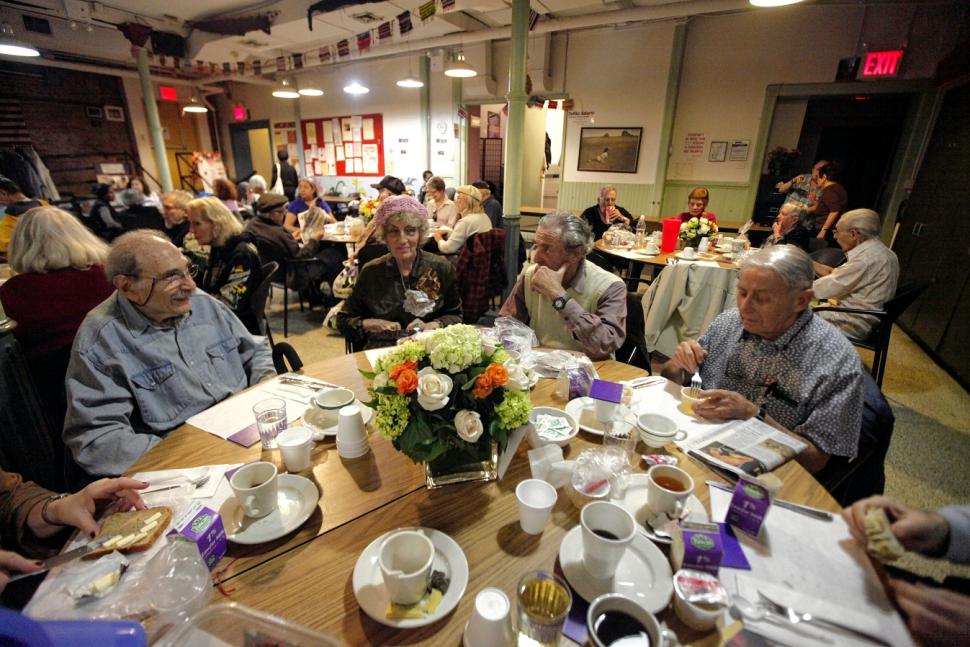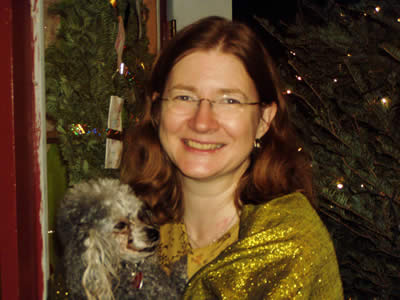POST 32: "Look to the Rainbow"
 JAN HUS PRESBYTERIAN CHURCH AND NEIGHBORHOOD HOUSE
JAN HUS PRESBYTERIAN CHURCH AND NEIGHBORHOOD HOUSE
“God made the world for the delight of human beings – if we could see His goodness everywhere, His concern for us, His awareness of our needs: the phone call we’ve waited for, the ride we are offered, the letter in the mail, just the little things He does for us throughout the day. As we remember and notice His love for us, we just begin to fall in love with Him because He is so busy with us – you just can’t resist Him. I believe there’s no such thing as luck in life, it’s God's love, it’s His.” Mother Teresa
Forrest continued his studies at the Blanton-Peale Institute and later for several years at the C.G. Jung Institute. It was great having an analyst in the family, given we were such a collection of neurotics and dreamers. It was a golden time in our lives; we read out loud the stories of contemporary archetypes: J.R.R. Tolkien’s The Lord of the Rings, we devoured the Harry Potter series by J.R. Rowling as they came out, and explained to Hannah and Andrew how they conveyed moral, ethical themes and symbols that had little to do with “evil and witchcraft,” we delved into Ursula LeGuin’s Earthsea series. In the midst of all this I tried to pretend not to notice that Barry paid a visit to New York City in 2007.
Shortly after Forrest and I married, I had the privilege to begin a new ministry at Jan Hus Presbyterian Church on 74th Street on Manhattan’s Upper East Side. What an honor it was to serve at this amazing church for five years. Part of the church’s problem is its immediate image to an outsider: what comes to mind when you think of the Upper East Side and the name Jan Hus? Some do-gooder socialite who chairs the 74th Street beautification and benevolent association. Far from it.
Jan Hus (pronounced Jawn Hoos) was a 15th century Bohemian (Czech) priest who tried to introduce reforms to the Church, some as basic as that people should be allowed to read the bible in their own language. He condemned clerical and ecclesiastical abuses. All this led Hus to the stake – but the Bohemian Brethren are, if anything, determined and passionate, they survived even persecution from the Reformers and some of them ended up immigrants in the Manhattan neighborhood of Yorkville, where the hoi polloi of Czechs, Germans, Austrians, Italians, all carved out bits and pieces and had amazing restaurants, beer gardens, pastry shops, cigar shops, ethnic butchers, barbers, pharmacies, athletic leagues of every nationality before it all slowly vanished and became home of the hoity toity and designer stores.
Pastor Pisek, one of the founding pastors, was free-thinking in his own ways and performed marriages between men and women from different ethnic groups, which was something akin to performing interracial marriages in the 1950s. His enthusiasm to help make these marriages was a part of what helped to build Jan Hus Church.
Around 1903, Pastor Pisek was out in the Midwest and came into a hotel bar where a man was playing the piano. The man was tall, athletic and friendly, and by the end of the conversation, Pisek had invited Mr. Charles M.H. Atherton to come to Jan Hus Church as Music Director. Atherton, an American born in 1873, had been a professional baseball player. He came to Jan Hus and became Pisek’s companion and colleague here at the church for the rest of Pisek’s life. (In his will, Pisek referred to Atherton as his “bosom friend.”)
Perhaps because of its strong Bohemian roots, the Church over the years developed strong principles of conscience, creativity, and social justice.
Jan Hus Church was the place where Presbyterian Welcome (now Parity) was founded in 1997 to advocate and support the full participation of individuals in contexts of faith, regardless of sexual orientation, gender identity or expression. The church championed inclusive language (using inclusive pronouns when referring to God) and downplayed the hierarchical “divide” between clergy and laity. And pets were allowed in worship. One fellow often brought his macaw, and the church cat, Keeper, would often sit on the windowsills observing the action.
When I arrived, Jan Hus was a small congregation who like to call themselves “Hussites.” The church has a beautiful sanctuary and Neighborhood House that is home to the full-time senior center, nursery school, and homeless outreach and advocacy program, about 30 AA groups, the Indonesian Presbyterian Church, afterschool programs and the Jan Hus Playhouse Theatre. This theatre was where Barbra Streisand cut her acting teeth in the early 1960s and was home to the improv comedy club, Chicago City Limits, hosted by comedians like Robin Williams, Jerry Seinfeld, Jon Stewart, Paul Reiser, Brett Butler, Larry Miller, and Bill Irwin. I am so glad to see it’s come full circle and Chicago City Limits is back at the Jan Hus Playhouse Theatre.
When I arrived at Jan Hus, the space was not well kept and there was disorganization. We went to work clearing clutter and making entryways convey hospitality. One bit of change I am proud of is convincing the church council not to see the Neighborhood House as a burden but as an asset. We started adding Neighborhood House to its name: Jan Hus Presbyterian Church and Neighborhood House. That’s one change that seems to have stuck.
Overall Jan Hus is an anomaly. Jan Hus is an extremely progressive congregation serving the poor in one of the wealthiest neighborhoods in the country. One woman remains forever in my memory as the epitome of Jan Hus. Rose was in her mid-nineties when I came to the “Hus.” She was the last of the original congregation and vaguely remembered Rev. Pisek’s ministry.
Rose’s parents were immigrants from the Czech lands which became Czechoslovakia in 1918. They lived in one of the tiny tenement apartments that dotted the corridor of Second Avenue in the Yorkville neighborhood of Manhattan. Rose’s apartment, where she had lived for over 63 years and had survived two husbands, was a 4-story walk-up which still had a tub in the kitchen. Now Rose faithfully for years came to the church and in the lobby set up a little office next to the senior center and homeless outreach office. It was Rose’s office and no one messed with it.
Neighbors in this posh environ would drop off bags of all kinds of crap as donations to the church. Some of it was nice, but a lot of it went straight to the trash. We’d look at it and wonder, what the hell were you thinking? Homeless people don’t deserve torn and stained clothing! However Rose didn’t judge. She would diligently sift through each bag. She would take the best and set up her flea market in the lobby, every single day. Rose’s tchotchkes, from designer dresses to ripped tea towels. The old ladies going to the senior center would haggle with her. She’d give away things to the homeless folks. The parents and nannies of the nursery school would take pity and buy a few things. Then every day she’d place in an envelope 50 cents, five dollars, whatever she had earned, and give it to the church’s secretary. It was a modest amount, just a widow’s mite, but I’m sure in Jesus’ eyes it was more enormous than a billionaire’s bank statement.
There’s a story about Rose that I just love. Well into her 90s, she attended a gay rights’ rally with fellow Hussites. An interviewer, bemused at this great-grandmotherly figure, came up to her and dared ask her, “do you believe in gay rights?” Rose pulled herself up to her 5-foot height and retorted, “I believe in rights for all people!” Then she went in for the kill.
“You gotta problem with that?!”
God bless you, Rose. I know you are one of the most brilliant stars shining down upon us.
Notes:
http://www.goodreads.com/quotes/139678-god-made-the-world-for-the-delight-of-human-beings--
http://www.findagrave.com/cgi-bin/fg.cgi?page=gr&GRid=113859919
http://www.janhus.org/jan-hus-playhouse/.
Give the gift of music to the next generation through donations to:
The Manilow Music Project
8295 South La Cienega Boulevard
Inglewood, CA 90301
[email protected]
Click here to go to the next post or click here to return to the previous post.
Forrest continued his studies at the Blanton-Peale Institute and later for several years at the C.G. Jung Institute. It was great having an analyst in the family, given we were such a collection of neurotics and dreamers. It was a golden time in our lives; we read out loud the stories of contemporary archetypes: J.R.R. Tolkien’s The Lord of the Rings, we devoured the Harry Potter series by J.R. Rowling as they came out, and explained to Hannah and Andrew how they conveyed moral, ethical themes and symbols that had little to do with “evil and witchcraft,” we delved into Ursula LeGuin’s Earthsea series. In the midst of all this I tried to pretend not to notice that Barry paid a visit to New York City in 2007.
Shortly after Forrest and I married, I had the privilege to begin a new ministry at Jan Hus Presbyterian Church on 74th Street on Manhattan’s Upper East Side. What an honor it was to serve at this amazing church for five years. Part of the church’s problem is its immediate image to an outsider: what comes to mind when you think of the Upper East Side and the name Jan Hus? Some do-gooder socialite who chairs the 74th Street beautification and benevolent association. Far from it.
Jan Hus (pronounced Jawn Hoos) was a 15th century Bohemian (Czech) priest who tried to introduce reforms to the Church, some as basic as that people should be allowed to read the bible in their own language. He condemned clerical and ecclesiastical abuses. All this led Hus to the stake – but the Bohemian Brethren are, if anything, determined and passionate, they survived even persecution from the Reformers and some of them ended up immigrants in the Manhattan neighborhood of Yorkville, where the hoi polloi of Czechs, Germans, Austrians, Italians, all carved out bits and pieces and had amazing restaurants, beer gardens, pastry shops, cigar shops, ethnic butchers, barbers, pharmacies, athletic leagues of every nationality before it all slowly vanished and became home of the hoity toity and designer stores.
Pastor Pisek, one of the founding pastors, was free-thinking in his own ways and performed marriages between men and women from different ethnic groups, which was something akin to performing interracial marriages in the 1950s. His enthusiasm to help make these marriages was a part of what helped to build Jan Hus Church.
Around 1903, Pastor Pisek was out in the Midwest and came into a hotel bar where a man was playing the piano. The man was tall, athletic and friendly, and by the end of the conversation, Pisek had invited Mr. Charles M.H. Atherton to come to Jan Hus Church as Music Director. Atherton, an American born in 1873, had been a professional baseball player. He came to Jan Hus and became Pisek’s companion and colleague here at the church for the rest of Pisek’s life. (In his will, Pisek referred to Atherton as his “bosom friend.”)
Perhaps because of its strong Bohemian roots, the Church over the years developed strong principles of conscience, creativity, and social justice.
Jan Hus Church was the place where Presbyterian Welcome (now Parity) was founded in 1997 to advocate and support the full participation of individuals in contexts of faith, regardless of sexual orientation, gender identity or expression. The church championed inclusive language (using inclusive pronouns when referring to God) and downplayed the hierarchical “divide” between clergy and laity. And pets were allowed in worship. One fellow often brought his macaw, and the church cat, Keeper, would often sit on the windowsills observing the action.
When I arrived, Jan Hus was a small congregation who like to call themselves “Hussites.” The church has a beautiful sanctuary and Neighborhood House that is home to the full-time senior center, nursery school, and homeless outreach and advocacy program, about 30 AA groups, the Indonesian Presbyterian Church, afterschool programs and the Jan Hus Playhouse Theatre. This theatre was where Barbra Streisand cut her acting teeth in the early 1960s and was home to the improv comedy club, Chicago City Limits, hosted by comedians like Robin Williams, Jerry Seinfeld, Jon Stewart, Paul Reiser, Brett Butler, Larry Miller, and Bill Irwin. I am so glad to see it’s come full circle and Chicago City Limits is back at the Jan Hus Playhouse Theatre.
When I arrived at Jan Hus, the space was not well kept and there was disorganization. We went to work clearing clutter and making entryways convey hospitality. One bit of change I am proud of is convincing the church council not to see the Neighborhood House as a burden but as an asset. We started adding Neighborhood House to its name: Jan Hus Presbyterian Church and Neighborhood House. That’s one change that seems to have stuck.
Overall Jan Hus is an anomaly. Jan Hus is an extremely progressive congregation serving the poor in one of the wealthiest neighborhoods in the country. One woman remains forever in my memory as the epitome of Jan Hus. Rose was in her mid-nineties when I came to the “Hus.” She was the last of the original congregation and vaguely remembered Rev. Pisek’s ministry.
Rose’s parents were immigrants from the Czech lands which became Czechoslovakia in 1918. They lived in one of the tiny tenement apartments that dotted the corridor of Second Avenue in the Yorkville neighborhood of Manhattan. Rose’s apartment, where she had lived for over 63 years and had survived two husbands, was a 4-story walk-up which still had a tub in the kitchen. Now Rose faithfully for years came to the church and in the lobby set up a little office next to the senior center and homeless outreach office. It was Rose’s office and no one messed with it.
Neighbors in this posh environ would drop off bags of all kinds of crap as donations to the church. Some of it was nice, but a lot of it went straight to the trash. We’d look at it and wonder, what the hell were you thinking? Homeless people don’t deserve torn and stained clothing! However Rose didn’t judge. She would diligently sift through each bag. She would take the best and set up her flea market in the lobby, every single day. Rose’s tchotchkes, from designer dresses to ripped tea towels. The old ladies going to the senior center would haggle with her. She’d give away things to the homeless folks. The parents and nannies of the nursery school would take pity and buy a few things. Then every day she’d place in an envelope 50 cents, five dollars, whatever she had earned, and give it to the church’s secretary. It was a modest amount, just a widow’s mite, but I’m sure in Jesus’ eyes it was more enormous than a billionaire’s bank statement.
There’s a story about Rose that I just love. Well into her 90s, she attended a gay rights’ rally with fellow Hussites. An interviewer, bemused at this great-grandmotherly figure, came up to her and dared ask her, “do you believe in gay rights?” Rose pulled herself up to her 5-foot height and retorted, “I believe in rights for all people!” Then she went in for the kill.
“You gotta problem with that?!”
God bless you, Rose. I know you are one of the most brilliant stars shining down upon us.
Notes:
http://www.goodreads.com/quotes/139678-god-made-the-world-for-the-delight-of-human-beings--
http://www.findagrave.com/cgi-bin/fg.cgi?page=gr&GRid=113859919
http://www.janhus.org/jan-hus-playhouse/.
Give the gift of music to the next generation through donations to:
The Manilow Music Project
8295 South La Cienega Boulevard
Inglewood, CA 90301
[email protected]
Click here to go to the next post or click here to return to the previous post.

